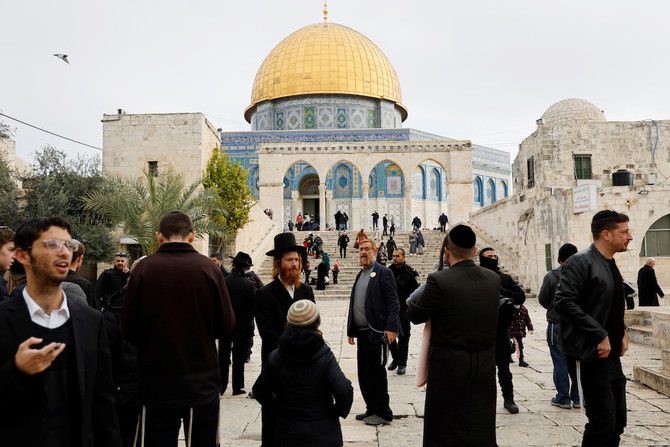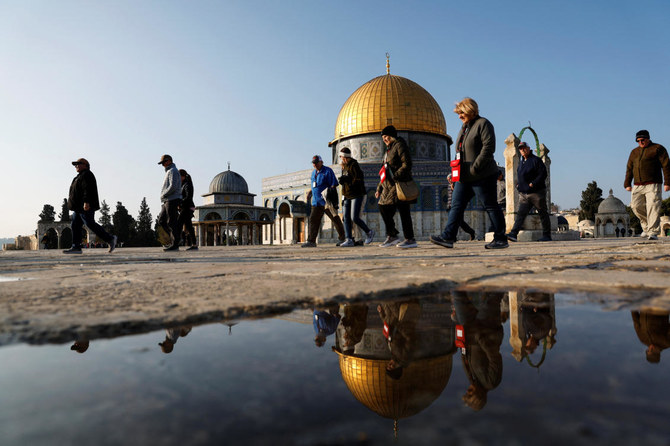RAMALLAH: Saudi Arabia has led a chorus of condemnation following a visit on Tuesday by Israel’s far-right national security minister to Jerusalem's Al-Aqsa Mosque compound.
The move, by firebrand Itamar Ben-Gvir, has enraged Palestinians, while the US warned of steps that may harm the status quo.
The Kingdom’s Foreign Ministry issued a statement in which it denounced the “provocative action” by the Israeli official.
Ben-Gvir’s visit to the site, under heavy security, triggered a wave of condemnations by Arab states and organizations who saw the act as a flagrant violation of the sanctity of the location.
The Organization of Islamic Cooperation described the visit “as part of Israel’s attempts to change the existing historical and legal status of the blessed Al-Aqsa Mosque.”
The OIC added it considered the act “a provocation to the feelings of all Muslims and a flagrant violation of relevant international resolutions.”
Palestinian Prime Minister Mohammad Shtayyeh claimed the visit was an attempt to turn the mosque complex “into a Jewish temple.”
Addressing his Cabinet, Shtayyeh called on Palestinians to “confront the raids into Al-Aqsa Mosque.”
The Palestinian Foreign Ministry said it “strongly condemns the storming of Al-Aqsa Mosque by the extremist minister Ben-Gvir and views it as an unprecedented provocation and a dangerous escalation of the conflict.”
The Foreign Ministry of Egypt — which serves as a key mediator in Gaza — warned “of the negative consequences of such actions on security and stability” in the Occupied Palestinian Territories and the wider region.
Jordan said it condemned in the “severest of terms” the visit to the Al-Aqsa Mosque and “violating its sanctity.”
Its Foreign Ministry added that the visit opposed international law and “the historic and legal status quo in Jerusalem.”
The UAE condemned Ben-Gvir's “storming” of Al-Aqsa, while Kuwait issued a similar statement.
A White House National Security Council spokesperson called on Israeli Prime Minister Benjamin Netanyahu to preserve his commitment to holy sites, and added: “The United States stands firmly for the preservation of the status quo with respect to the holy sites in Jerusalem.
“Any unilateral action that jeopardizes the status quo is unacceptable.”
Ben-Gvir tweeted after his visit: “We are a government that does not surrender to the threats of Hamas.
“The Temple Mount (Al-Aqsa Mosque) is the most important place for the people of Israel.
“We preserve freedom of worship for Muslims and Christians, but the Jews also have the right to the place and to go up to it.
“We must deal with an iron fist against anyone who threatens us.”
Palestinian Minister of Awqaf and Religious Affairs Hatem Al-Bakri said that Israeli settlers had increased incursions into Al-Aqsa during December.
Israeli Army Radio reported that the chief of the country’s security agency Shin Bet and Israel’s police chief had given the green light to Ben-Gvir’s trip.
Israel’s security services raised their state of alert following the visit after threats from Hamas and Islamic Jihad.
Palestinian factions called on the people of the West Bank to escalate their opposition to the Israeli army and settlers in defense of Al-Aqsa.
They also called on the Palestinian Authority to stop security coordination with the Israeli military.
Mukhaimer Abu Saada, a professor of political science at Al-Azhar University in Gaza, told Arab News that both Netanyahu and Ben-Gvir misled the Palestinians about the visit, which had taken place when there were no Palestinians inside Al-Aqsa Mosque.
He told Arab News: “I believe that Hamas will not go for an armed escalation, but it may react indirectly in the coming days, either by firing a missile or shooting at the Israeli forces deployed along the border with the Gaza Strip.
“If Ben-Gvir’s visit had taken place openly, it would have been understood as a challenge to Hamas, and the situation would have been more difficult and complicated.”
A US Embassy spokesperson said Ambassador to Israel Tom Nides “has been very clear in conversations with the Israeli government on the issue of preserving the status quo in Jerusalem’s holy sites. Actions that prevent that are unacceptable.”
Nabil Abu Rudeineh, the Palestinian presidential spokesman, said Ben-Gvir’s visit was a challenge to the Palestinian people, the Arab nation, and the international community.
A statement from the UK said: “We are concerned by the visit to Haram Al-Sharif/Temple Mount by minister Ben-Gvir today.
“The UK remains committed to the status quo, and all must avoid actions which inflame tensions and undermine the cause of peace.”
Ben-Gvir’s visit came just days after he took office as national security minister, with powers over police.
Al-Aqsa Mosque is the third-holiest place in Islam and the most sacred site to Jews, who refer to the compound as the Temple Mount.
Under a long-standing agreement, non-Muslims can visit the site at specific times but are not allowed to pray there.
In recent years, a growing number of Jews, most of them Israeli nationalists, have covertly prayed at the compound.
Situated in the walled Old City of Israel-annexed East Jerusalem, the compound is administered by Jordan’s Waqf Council, with Israeli forces operating there and controlling access.
Meanwhile, Israeli forces shot dead Adam Ayad, 16, during their incursion into the Dheisheh refugee camp in Bethlehem early on Tuesday.
It brought to three the number of Palestinians killed by Israeli forces in the first three days of 2023. A comprehensive protest strike has been announced in Bethlehem.



























